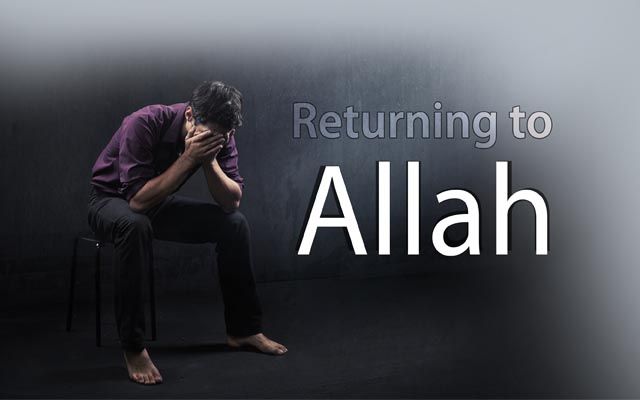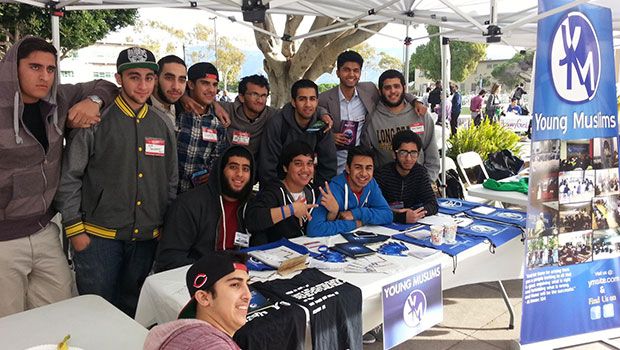Say, “O My servants who have transgressed against themselves [by sinning], do not despair of the mercy of Allah . Indeed, Allah forgives all sins. Indeed, it is He who is the Forgiving, the Merciful” (Qur’an 39:53).
In this ayah, Allah SWT is addressing two different audiences. The first one addressed is the individual who is trying to preach Allah’s message. The ayah begins with the word “qul”, which means “say,” and the form of the word is singular. First and foremost, Allah SWT is talking to Prophet Muhammed, peace be upon him. Allah is telling His messenger what the sinner needs to hear. By extension, anyone who makes da’wah is being addressed as well.
When we are at the point of making tawbah, and have opened the door of returning back to Allah SWT, we need to make total submission to Allah
The second one addressed in the verse is someone who has sinned so much that he has no hope of turning back to Allah SWT, and he has so much remorse and feelings of guilt that he thinks he has reached a point where there’s no way of receiving forgiveness. This sinner is being addressed through the agency of the Prophet or the da’iyah who recites and/or explains this verse to him and conveys the message of the boundless forgiveness and mercy of Allah SWT.
Notice that Allah uses the word “ibadi,” which means “servants” or “slaves.” Many may think that the verse is only addressing a person who is obedient to Allah and generally abiding by the precepts of His deen but slips from his state of servitude to His Lord and commits a sin. However, Allah SWT is addressing any sinner, whatever his or her degree of sin. In fact, whether we surrender our wills or not, whether we abide by His commands or not, we are all servants of the One who has created the universe and has dominion over it. The Qur’an says,
“Do you not see that it is Allah Whose praises all beings in the heavens and on earth do celebrate, and the birds (of the air) with wings outspread? Each one knows its own (mode of) prayer and praise. And Allah knows well all that they do. And unto Allah belongs the Sovereignty of the heavens and the earth, and unto Allah is the journeying” (24:41-42).
All created things submit to Allah SWT in the fundamental sense of existing solely within the framework of His design, and this includes the return to Him for judgment; in the case of humans, however, there is a choice to consciously and voluntarily surrender or not, before death and the return to Him on that Day. The Qur’an says in this regard,
Every time we see or do or experience something shameless, our hearts become more hardened!
“Do you not realise that everything in the heavens and earth prostrates/submits to Allah: the sun, the moon, the stars, the mountains, the trees, and the animals? So do many human beings, though for many others punishment is well deserved. Anyone disgraced by Allah will have no one to honor him: Allah does whatever He wills “ (Qur’an 22:18).
Allah wants us to know, and to convey to those who are doing wrong, that He is a merciful Lord toward His servants, and His mercy prevails over His wrath. Yet, Allah points out that by crossing the limits we ultimately are harming our own selves, in this life and in the hereafter. One example is when we are exposed, or expose ourselves, to something that is shameless. Every time we see or do or experience something shameless, our hearts become more hardened. Unlike animals, Allah SWT created us with feelings of shame (the pain and uneasiness that arises in the heart when perceiving something dishonorable, immodest, improper, or indecent). The more we are exposed to shamelessness, the closer we get to the lower status of animals, gradually reaching a point of great degradation. An animal has no control over its desires or urges. If it’s hungry, it bites; if it sees a potential mate, it runs after it. Whatever impulse or instinct it feels, the animal indulges it.
Unfortunately, this animalistic characteristic is conveyed by the contemporary phrase of “I do whatever I feel like doing….” If we don’t care about what we are doing, wrong or right, halal or haram, we should know that we are resembling animal behavior. Allah gave us the noble status of the human being, but we then are bringing ourselves down by indulging our lower instincts and impulses. Muslims should have a sense of haya (modesty, healthy shyness, self-respect). A person without this characteristic has no chance of having a good family; everything will be destroyed if we lose the sense of haya. Our relationships with our spouses and parents and other relatives will not be good; we certainly will not be able to properly raise our children.
Yet, whatever sins have been committed, this verse is telling us that there is still hope of returning back to Allah SWT. But many times when people are in this position, shaitan comes to them and tells them that they are so deeply drowning in sin that they shouldn’t hope for Allah’s forgiveness. Shaitan capitalizes on one sin of ours and tries to trick us into doing more wrong things, thus taking us further away from Allah. But this is erroneous thinking. Can a man’s evil deeds compare with the power of Allah’s mercy? Consider the following hadeeth qudsi:
“O son of Adam, as long as you call upon Me and put your hope in Me, I have forgiven you for what you have done and I do not mind. O son of Adam, if your sins were to reach the clouds of the sky and then you would seek My forgiveness, I would forgive you. O son of Adam, if you were to come to Me with sins that are close to filling the earth and then you would meet Me without ascribing any partners with Me, I would certainly bring to you forgiveness nearly as great as it.”
The worst thing we can do is to lose hope in Allah. Those who have harmed themselves by committing sins should not lose hope of receiving forgiveness. We should learn how to supplicate Allah SWT and ask for forgiveness, believing with full heart that Allah not only hears us, He sees us, and knows full well what resides in our hearts. Despite having wronged ourselves by sinning, Allah still considers us as His slaves who are worthy of being being forgiven if we make tawbah (repentance) sincerely. He is extremely Forgiving (Al-Ghafoor) and always Merciful (Al-Raheem).
When we are at the point of making tawbah, and have opened the door of returning back to Allah SWT, we need to make total submission to Him. We have to completely surrender our will to His Lordship. For example, we have to surrender our ego, our temptations, our bad habits, the impulses of our tongue, habit of wasting time — we have to give up all of these for the sake of Allah SWT. And we best do this before time ends and punishment comes. On the Day of Judgment, some will say that if only Allah had guided them, they would have been good; and Allah will respond to them that He did guide them by the Book of guidance, with a clear message and signs in nature, in history, and in their own souls. Yet, they belied that guidance.
The ayah cited reminds us that we are Allah’s slaves, and as such we should guard ourselves against sin and wrongdoing by submitting to His will. When we do commit a sin, we must turn to Him in repentence and ask for forgiveness, never losing hope of His mercy. Then we will avoid being among those human beings who refuse to submit and never repent; deserving punishment, they are disgraced and dishonored on the Day of Reckoning. Rather we hope to be counted among all the things in the heavens and earth that submit to Allah SWT and celebrate His praises. For unto Allah SWT is the journeying.
Duas for Forgiveness From the Quran
Rabbanaa faghfir lana thunoobana wa kaffir ‘anna sayyiaatinaa wa tawaffanaa ma ‘al abraar.
Our Lord! Forgive us our sins and efface our bad deeds and take our souls in the company of the righteous (Quran 3:193).
Rabbana thalamnaa anfusanaa wa illam taghfir lanaa wa tar hamnaa lanakoo nunna meen al khasireen.
Our Lord! We have sinned against ourselves and unless You grant us forgiveness and bestow Your mercy upon us, we shall most certainly be lost.
Rabbanagh firlanaa wa li ikhwaa ninallatheena sabaqoonaa bil eemani wa la taj’al fee quloobinaa ghillall lillatheena aamanoo rabbanaa innaka raoofur raheem.
Our Lord! Forgive us, and our brethren who came before us into the Faith, and leave not, in our hearts, rancour (or sense of injury) against those who have believed. Our Lord! Thou art indeed Full of Kindness, Most Merciful (Quran 59:10).






